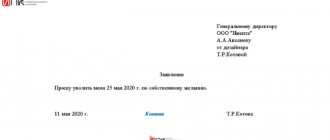When the parties to an employment contract want to part ways without bloodshed and end their employment relationship, they resort to such a form of dismissal as “dismissal by agreement of the parties” (Article 78 of the Labor Code of the Russian Federation). This method is much safer and faster compared to laying off workers. Moreover, in the latter case, a number of formalities must be observed so that the employee subsequently cannot be reinstated by the court.
Article 78 of the Labor Code of the Russian Federation “Dismissal by agreement of the parties”, sample agreement
The law provides for several grounds for termination of an employment contract, one of which is the agreement of the parties.
The norm allowing it is contained in clause 1, part 1, art. 77, art. 78 Labor Code of the Russian Federation. Is it possible to dismiss an employee during a bad epidemiological situation due to coronavirus by agreement of the parties or for other reasons? The answer to this question was given by ConsultantPlus experts. To find out, get trial access to the system for free and go to the Ready solution.
If there is mutual agreement to terminate cooperation, it is not necessary to draw up a separate document. You can get by with a manager's visa on the application of the resigning employee , in which he indicates the reason for dismissal and necessarily refers to the mutual agreement between the parties. As a result, the employer receives significant evidence of the employee’s good will to terminate the contract, which sometimes helps in labor disputes.
However, in most cases, employers prefer to issue a document signed by the employee. The agreement then carries an additional information and legal burden, and in addition to the main provisions, it fixes the procedure for transferring cases, determines the amount of compensation, etc.
Below is a sample dismissal agreement by agreement of the parties.
The agreement can be signed any day before the employee’s dismissal. But once a document is endorsed on both sides, it is no longer possible to revoke the signature, no matter which party was the initiator (with rare exceptions). Therefore, it is more profitable for the employer to terminate the employment contract in accordance with the provisions of clause 1, part 1, art. 77 of the Labor Code of the Russian Federation, especially if you have to fire a “difficult” employee.
IMPORTANT! If the employee submits a certificate from the antenatal clinic about pregnancy, then she has the right to revoke the dismissal agreement.
You can see a selection of controversial situations that arise in practice during dismissal by agreement in ConsultantPlus. See the full list of such situations and practical recommendations from experts for each of them by getting trial access to K+.
An entry in the employment record about dismissal by agreement of the parties is made as standard in column 3. Example entry:
- “The employment contract was terminated by agreement of the parties, paragraph 1 of part one of Article 77 of the Labor Code of the Russian Federation”;
- “Dismissed by agreement of the parties, paragraph 1 of part one of Article 77 of the Labor Code of the Russian Federation.”
Legislation on compensation payments
The law contains very little information on this matter. There is practically no actual legal regulation of this issue. In labor legislation there is only one article on termination of a contract by agreement. If a company and employees enter into a collective agreement, it may contain details about the purpose of this type of payment and the procedures for regulating relations in this regard. Other local acts may also provide information on the payment of severance pay. For example, the rules may be contained in the Compensation Regulations.
In addition, the conditions for payment of compensation can be established individually when concluding an employment contract with each individual. Typically, these provisions occur when contracts are concluded with managers or other employees who are hired for senior management positions.
There are no restrictions in the law regarding the composition and amount of monetary payments. It is worth noting that these funds should not be confused with the final payment issued, in particular:
- with wages for hours worked;
- with compensation for vacation days that the dismissed person did not have time to use.
Compensation upon dismissal by agreement of the parties
In ch. 27 of the Labor Code of the Russian Federation provides the types of compensation payments that an employer must issue to a resigning employee, and the grounds for such issues.
Read here how compensation is calculated upon dismissal.
If dismissal occurs by agreement of the parties, then only one type of compensation must be paid - for unused vacation. The right to other types of compensation is determined by the provisions of Art. 178 Labor Code of the Russian Federation . Such payments can be listed in detail separately in a collective or employment agreement.
It should be borne in mind that as soon as compensation obligations are included in the termination agreement, the employer may be held liable for indiscipline. This means that the defaulting employer will have to pay interest to the dismissed employee for the delay in the amounts due under the agreement.
However, in practice there are many lawsuits, as a result of which employees were denied severance pay, even when they were specified in the employment contract. For example, if a company goes bankrupt, judges recognize such terms of an employment contract as invalid. You should not provide an excessively high amount of compensation upon dismissal. This type of compensation does not create additional motivation for work; therefore, the court may refuse to pay an employee if there are negative financial consequences for the enterprise proven by the employer.
See also: “Dismissal by agreement of the parties on sick leave.”
Let's consider what features of calculating taxes and insurance premiums exist for compensation payments upon dismissal by mutual consent.
How to cancel an agreement to terminate a trade agreement?
In most cases, it is impossible/extremely difficult to withdraw an application unilaterally after signing an agreement, which cannot be said about dismissal of one’s own free will.
The RF Armed Forces grant this right only to pregnant women who, at the time of termination of the TD, did not know about their situation (see definitions of the RF Armed Forces No. 37-KG14-4 of 09.05.14 and No. 18-KG16-45 of 06.20.16. ). The plaintiff and his legal representative will have to prove their case long and hard through the court. In other cases, an agreement to terminate a trade union can be canceled only by mutual consent of both parties to the labor relationship (see paragraph 20 of the resolution of the Plenum of the Supreme Court No. 2 of March 17, 2004).
So, if an employer cites a woman’s pregnancy as a reason for dismissal, then he can expect legal consequences in accordance with Art. 145 of the Criminal Code of the Russian Federation. Criminal liability also threatens the employer and officials if the fact of forcing a pregnant woman to sign an agreement of this kind is proven in court.
Taxes and insurance premiums in connection with the payment of compensation upon dismissal
Upon dismissal from compensation amounts (except for payments for unused vacation), personal income tax is not calculated up to a certain limit. In accordance with the provisions of Art. 217 of the Tax Code of the Russian Federation, as soon as the amount of compensation exceeds 3 times the average monthly earnings, obligations to calculate this tax come into force. For persons who worked in the Far North, this threshold is set at 6 times monthly earnings (letter of the Ministry of Finance of Russia dated October 25, 2019 No. 03-04-06/82289, determination of the Armed Forces of the Russian Federation dated June 16, 2017 No. 307-KG16-19781) .
When issuing a 2-NDFL certificate:
- the amount of compensation is not included in the document if it is not subject to personal income tax;
- if the amount of compensation exceeds the amounts specified in Art. 217 of the Tax Code of the Russian Federation, then in terms of excess it is given with income code 4800.
Read more about the procedure for filling out a certificate in form 2-NDFL in the section “Certificate 2-NDFL in 2021 - 2020 (form and sample)” .
As for income tax, amounts paid as part of dismissal by mutual agreement are classified as labor costs (clause 9 of Article 255 of the Tax Code of the Russian Federation). At the same time, the letter of the Ministry of Finance of the Russian Federation dated April 23, 2019 No. 03-04-05/29191 draws attention to the following conditions for recognizing these payments as expenses:
- payments are determined in the employment or collective agreement, an additional agreement to the employment contract or directly in the agreement on termination of the contract;
- the criteria of Art. 252 of the Tax Code of the Russian Federation.
IMPORTANT! One of the main criteria for recognizing expenses for profit tax purposes, set out in Art. 252 of the Tax Code of the Russian Federation, is economic feasibility.
Therefore, in order to avoid the risk of additional income tax charges, it is worth taking care of a reliable economic justification for payments. First, set payments in reasonable amounts. Secondly, try to justify the dismissal of the employee on this basis. For example, the need to hire a more highly qualified specialist due to the increasing complexity of tasks.
How much dismissal pay can be safely written off as expenses can be found here.
When an employee is dismissed by mutual consent, compensation payments are not subject to insurance contributions within the same limits as established for personal income tax (3 times and 6 times average earnings). And also, by analogy with personal income tax, the exception is compensation paid for unused vacation; this amount is included in the base for calculating insurance premiums. The non-taxable limit is established in paragraph. 6 subp. 2 p. 1 art. 422 Tax Code of the Russian Federation, art. 20.2 of the Law “On compulsory social insurance against accidents at work and occupational diseases” dated July 24, 1998 No. 125-FZ.
Personal income tax
Being compensation associated with the dismissal of employees, severance pay is not subject to personal income tax on the basis of subparagraph 3 of paragraph 1 of Article 217 of the Tax Code of the Russian Federation. But taking into account the limitation on the total amount of payments established by paragraph 8 of the said subclause. In case of dismissal by agreement of the parties, amounts of severance pay not exceeding three times the average monthly salary are exempt from taxation. For workers dismissed from organizations located in the Far North and equivalent areas, this limit is six times the average monthly salary.
This legal position was clarified to the territorial tax authorities in a letter from the Federal Tax Service of Russia dated June 29, 2017 No. SA-4-7/ [email protected] (clause 9).
Results
Dismissal by agreement of the parties today is perhaps the most popular basis for terminating an employment relationship. What should you remember when dismissing an employee on this basis?
- In case of disputes with employees, it is important to have evidence that both parties acted by mutual consent.
- When drawing up an agreement to terminate a contract, it makes sense to determine the amount of compensation and fix the procedure for transferring cases. When setting the amount of compensation, take care of the economic justification for the costs in order to avoid disputes with the tax authorities.
You can find more complete information on the topic in ConsultantPlus. Free trial access to the system for 2 days.
Tax Aspects
All employing companies have the status of tax agents. This creates an obligation to withhold tax on payments made to employees. However, certain types of compensation are subject to special rules for calculating taxes. There are two aspects that need attention:
- inclusion of compensation in labor costs to reduce the organization’s income tax;
- accrual of income tax on compensation.
Delivery of documents
All work-related documents (work book or information in the STD-R form, extracts from SZV-M, RSV and SZV-STAZH, salary certificate, etc.) are issued to the employee directly on the day of dismissal, that is, on the last working day. For more details, see “Documents when dismissing an employee.”
If the provision for the issuance of such documents is included in the text of the dismissal agreement, it is advisable to obtain a signature from the employee on the copy of the agreement that remains with the employer. This will confirm the timely transfer of the relevant papers to the dismissed employee.
What is paid to the employee - list of payments
In a situation where termination of an employment agreement is a mutual decision of both parties, the working citizen must necessarily receive the following types of payments:
- compensation for all remaining days of annual paid leave;
- salary for time worked but not yet paid.
Severance pay , which is also often paid in such cases, belongs to the category of additional payments (according to Article 178 of the Labor Code of the Russian Federation).
In other words, the law does not oblige the employer to provide this type of financial assistance to the employee.
Indemnities are only due on the condition that the technology and rules for their payment are reflected in the collective agreement or other internal documentation.
Compensation for unused vacation
This type of compensation payment is due to all employees with whom the employment contract is terminated. It does not matter on what basis the dismissal is issued.
On the last day of work, the number of unused days of annual basic and additional leave is counted. Next, average earnings are calculated based on the employee’s income for the last annual period.
The resulting average daily earnings are multiplied by the number of vacation days not taken off.
The amount must be paid to the resigning person along with his salary on the last day of work, which is established by agreement.
Calculation of compensation upon dismissal under a fixed-term employment contract.
Calculation of the amount of money withheld
As has already been clarified, only the portion of payments exceeding 3 months’ average income is subject to taxation. It follows from this that personal income tax will be withheld from the difference between the amount of compensation received and the average earnings for three months.
For example , over the last year, your average salary was 66 thousand rubles. To calculate the tax-free amount:
66,000 rubles * 3 = 198,000 rubles
If upon dismissal you are paid 264,000 rubles, then personal income tax will be calculated from the following difference:
264,000 rubles – 198,000 rubles = 66,000 rubles
The amount of deduction will be:
66,000 rubles * 13% = 8,580 rubles
The total amount of payments minus personal income tax is:
264,000 rubles - 8,580 rubles = 255,420 rubles
Accounting
In accordance with clause 5 of the Accounting Regulations “Expenses of the Organization” PBU 10/99, approved by Order of the Ministry of Finance of Russia dated May 6, 1999 No. 33n, the organization’s expenses for the payment of severance pay upon dismissal by agreement of the parties are expenses for ordinary activities.
Such expenses are recognized during the period of accrual of severance pay, regardless of the time of actual payment of funds in the accrued amount (clauses 6, 16, 18 of PBU 10/99). Based on the Instructions for the application of the Chart of Accounts for accounting the financial and economic activities of organizations, approved by Order of the Ministry of Finance of Russia dated October 31, 2000 No. 94n, the accrual of severance pay upon dismissal by agreement of the parties is reflected by an entry in the debit of the account, for example, 20 “Main production”, in correspondence with the credit of account 70 “Settlements with personnel for wages” (see table).
Dismissals with benefits
When a dismissal order is issued, it indicates the basis for releasing the employee from his position and the corresponding article of the Labor Code. Each reason has its own procedure for terminating employment agreements, which in many cases includes the accrual of “severance” benefits. It is based on the following grounds:
- liquidation of an enterprise, organization, firm;
- reduction in staff or numbers;
- professional unsuitability for medical reasons (if there is no other suitable vacancy or the employee’s desire to take it);
- complete loss of ability to work (according to a medical report);
- reluctance to continue working in changed working conditions;
- disagreement with transfer to another location following the employer;
- conscription into the army or substitute service;
- leaving maternity position;
- cancellation of an incorrectly drawn up employment contract;
- vacating a position for an employee who previously occupied it, who was wrongfully dismissed and reinstated by a court decision or labor inspectorate.
NOTE! Severance pay is available to almost any employee forced to leave their position, as long as they are in compliance with the law and the provisions of the employment contract.
Dismissal of pensioners and pre-retirees
Working pensioners and pre-retirees also have the right to resign by agreement of the parties to the employment contract. But there are nuances here too.
ATTENTION. Article 144.1 of the Criminal Code of the Russian Federation establishes criminal liability for the dismissal of pre-retirement employees. It occurs if the reason (motive) for dismissal is the employee’s age. This means that the dismissal agreement should not contain provisions from which it can be concluded that it was concluded in connection with the employee acquiring pre-retirement status. In particular, there is no need to indicate the fact that a person has reached the appropriate age, or whether he has benefits provided to pre-retirees.
As in other cases, the conclusion of the agreement must be voluntary. Otherwise, the pre-retirement person will be reinstated at work, the company will be fined (Part 1 of Article 5.27 of the Code of Administrative Offenses of the Russian Federation), and its manager may be brought to criminal liability (Article 144.1 of the Criminal Code of the Russian Federation).





